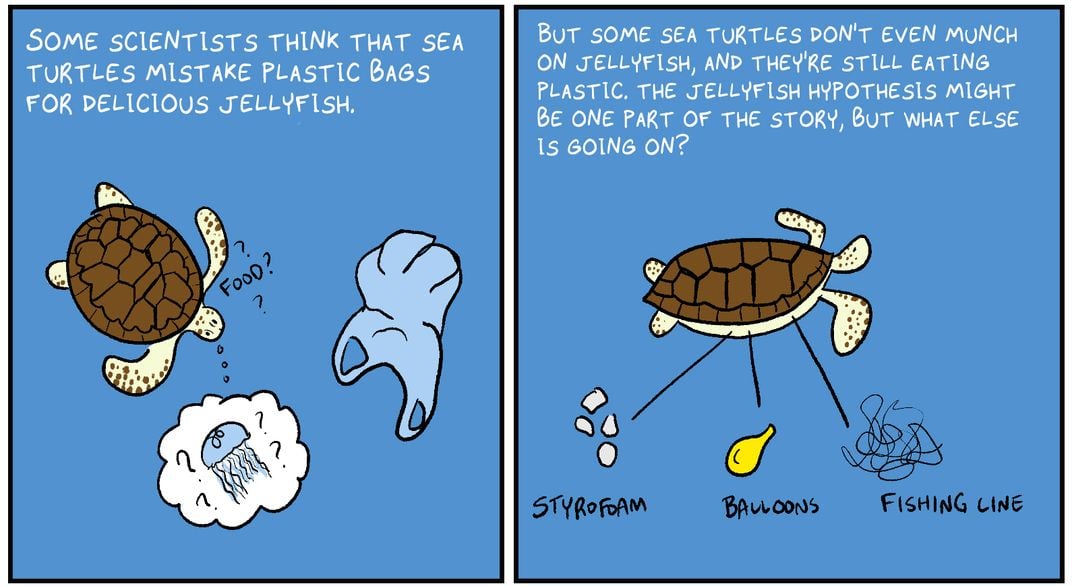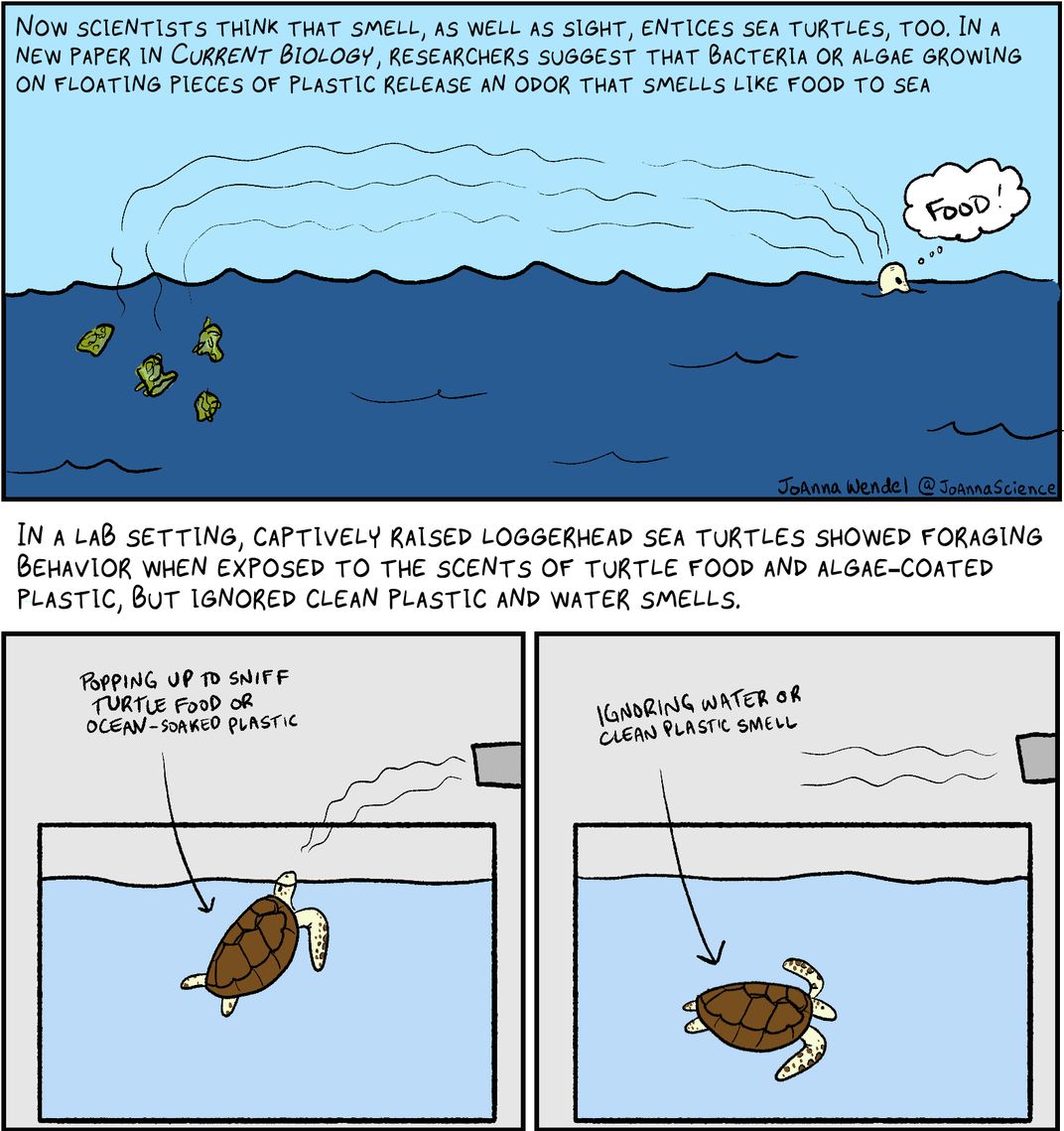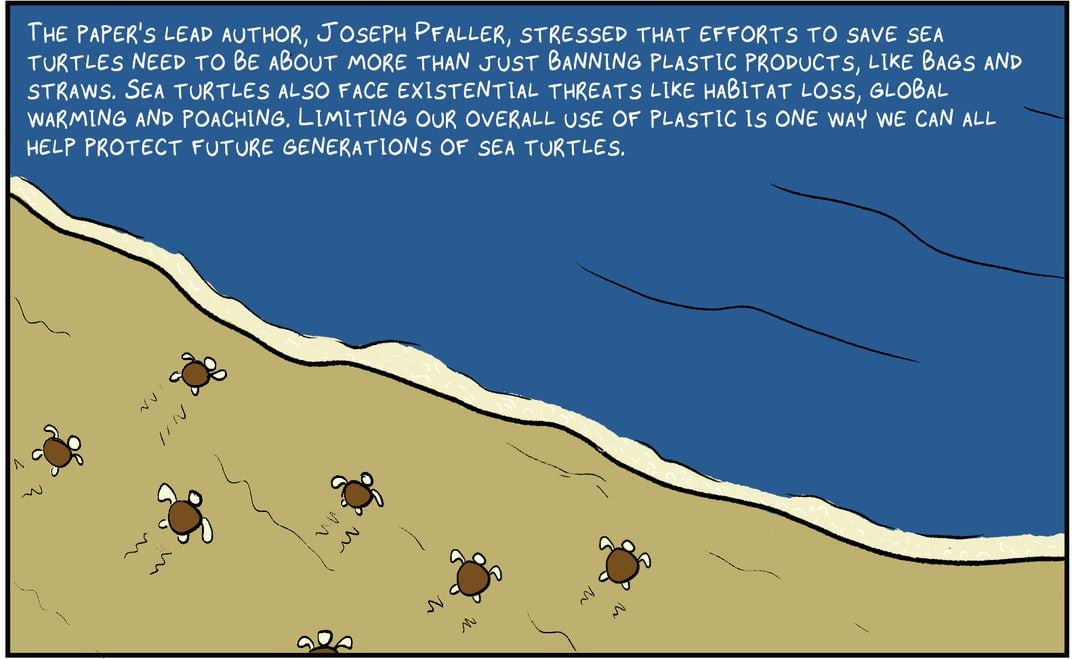Sea Turtles Might Be Eating Old Plastic Because It Smells Like Shrimp
Over time, trash that has been floating in the ocean gets covered in algae and other micro-organisms
:focal(309x242:310x243)/https://tf-cmsv2-smithsonianmag-media.s3.amazonaws.com/filer/78/64/7864ca87-d1e3-42cd-810e-b1c19b53d7b0/sea-turtle-joanna-wendel-plastic.jpg)
Plastic is everywhere, even in the deepest depths of the ocean. We know sea turtles, and other marine animals, eat it, but experts aren’t entirely sure why. In a new study published this week in Current Biology, researchers may have pinpointed one of the reasons these charismatic marine reptiles eat small bits of plastic floating in the ocean. These plastic pieces develop a coating of algae and microorganisms, which the researchers found smells like food to turtles.
“Basically any type of plastic can get colonized by bacteria, algae, green organisms,” says biologist Joseph Pfaller, lead author on the paper and director of the Caretta Research Project in Savannah, Georgia.
These microorganisms—just by living, reproducing, and dying on the pieces of plastic—produce a chemical compound in the water that becomes the molecule dimethyl sulfide when it hits the air. We might recognize the scent, too; dimethyl sulfide actually smells sort of like cooked fish or vegetables. To sea turtles, who poke their heads above the ocean’s surface to sniff out food, this odor means a tasty meal awaits nearby.
“The chemicals that in the past pulled turtles or whales or seabirds long distances [saying] ‘hey, here's a good place to go start swimming this direction,’ now these same chemicals are coming off of plastic flotsam,” Pfaller says.
To determine whether turtles really were following their nose to plastic, the researchers exposed captive-raised loggerhead turtles to the scents of water as a control, clean plastic, turtle food, and plastic that had been colonized by bacteria and small invertebrates after soaking in the ocean for five weeks. The turtles seemed to ignore the clean plastic and water scents, but actively sniffed at the air when the smell of turtle food (pellets made of fish and shrimp meal) and ocean-soaked plastic wafted over the surface of the water, inducing foraging behavior.
Marine scientist Amy Siuda of Eckerd University, who wasn’t involved in the study, says she wasn’t surprised that scents from biofouled plastic elicited a foraging response in the turtles, but she’s interested in whether these same airborne cues can be transmitted through water.
“I can imagine that a ghost fishing net drifting at the surface, serving as artificial substrate for a diverse community of rafting organisms, will emit these chemical cues on a scale appropriate for detection on the open ocean,” writes Siuda in an email. “But, are individual pieces of plastic small enough to be ingested by a sea turtle going to elicit the same behavioral response and at what distances?”
Pfaller noted that anywhere plastic floats in abundance in the water column, turtles—and perhaps other marine animals—might think that place is laden with food. And bottom line, sea turtles are eating plastic, no matter where it comes from.
“Let's not just focus on a random straw in a turtle's nose or the fact that plastic bags look like jellyfish,” Pfaller says. “It's an all plastic kind of thing.”
![Comic, Panel 1: [Sea turtle eats plastic water bottle.] Text, Panel 1: “We know sea turtles eat plastic, and sometimes, that can kill them.”](https://th-thumbnailer.cdn-si-edu.com/ByQcOUuzjVCVm3jIZzx87uR5BeI=/fit-in/1072x0/https://tf-cmsv2-smithsonianmag-media.s3.amazonaws.com/filer/fa/c5/fac57ade-5039-427f-9176-6598eb92b0cc/turtle_1a.jpg)


